A Snapshot of Autism Spectrum Disorder in Maryland
‹View Table of Contents
Download and print this page [PDF – 195 KB, Print Only]
Findings from the Maryland Autism and Developmental Disabilities Monitoring (MD-ADDM) program help us understand more about the number of children with autism spectrum disorder (ASD), the characteristics of those children, and the age at which they are first evaluated and diagnosed.

![]() SITE TRACKING AREA
SITE TRACKING AREA
Or 2.3% of 8-year-old children were identified with ASD in 2020
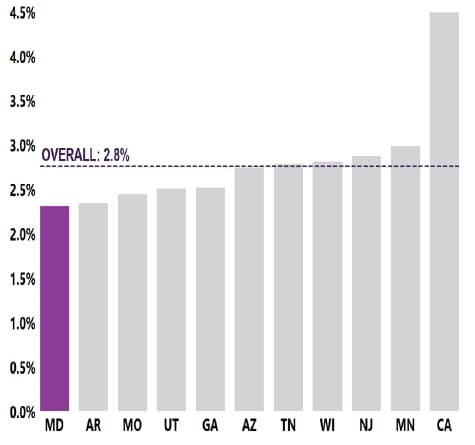
This percentage is lower than the overall percentage identified with ASD (2.8%) in all communities tracked by the CDC.
Or 1.7% of 4-year-old children were identified with ASD in 2020.
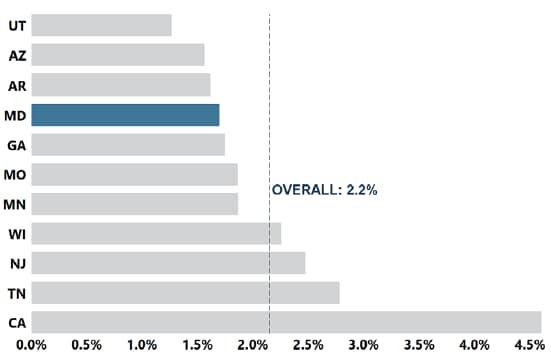
This percentage is lower than the overall percentage identified with ASD (2.2%) in all communities tracked by the CDC.
Among 8 year-olds, Black and Asian/Pacific Islander (A/PI) children were twice as likely to be identified with ASD as Hispanic and White children.
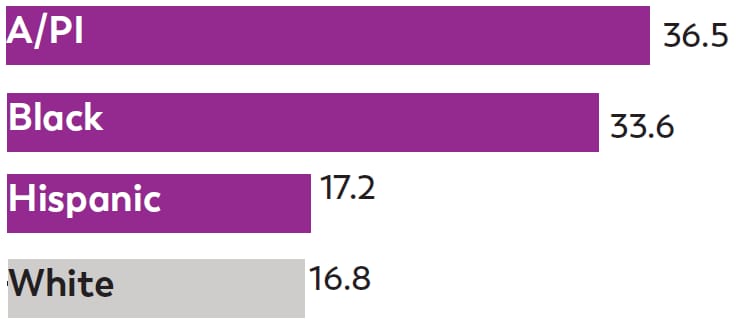
Values indicate prevalence per 1000.
Among 4-year-olds, Black children were 2.3 times as likely and Asian/Pacific Islander (A/PI) children were 1.9 times as likely to be identified with ASD as White children.
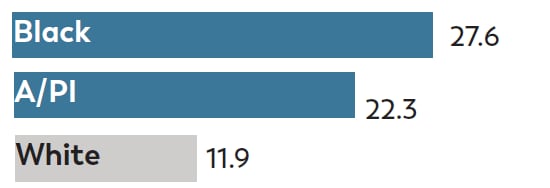
Values indicate prevalence per 1000. There were no significant differences in identification between Hispanic children and White children.
About 83% of 4-year-old children identified with ASD received a comprehensive developmental evaluation by 3 years of age.

About 60% of 8-year-old children identified with ASD received a Comprehensive Developmental Evaluation by age 3 years. This is a 11% decrease from 2018.

IQ data available for 60%
Of children identified with ASD by the MD-ADDM Project
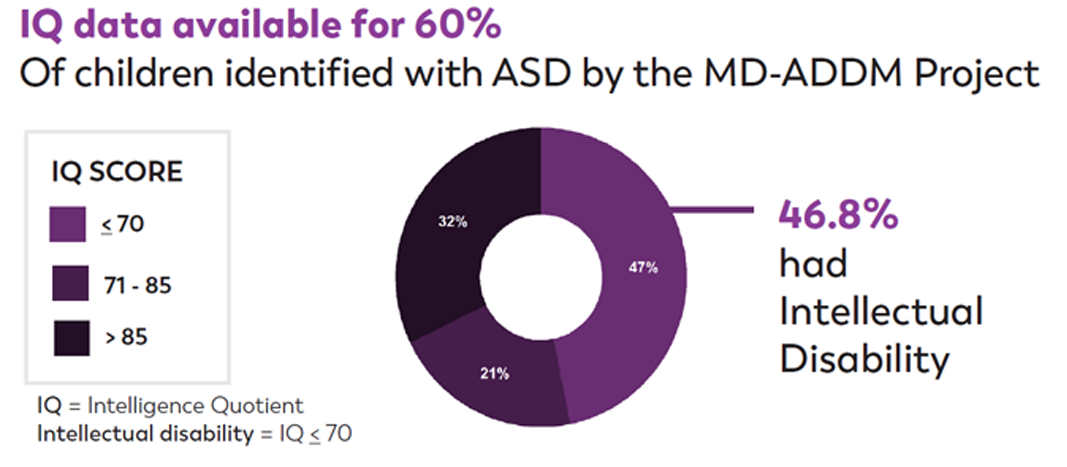
What are the key take-away messages from MADDSP?
- The prevalence of ASD in MD-ADDM continues to increase.
- Following the onset of COVID-19 in March 2020, there was a reduction in the number of evaluations in all ADDM communities, including MD-ADDM.
- Black and Asian/Pacific Islander children are more likely to be identified with ASD than White children in MD-ADDM.
- Most 4-year-old and 8-year-old children identified with ASD in MD-ADDM had a comprehensive evaluation by age 3 years, but more 4-year-old children had one compared with 8-year-olds.
How can this information be useful?
MD-ADDM’s latest findings can be used to
- Promote early identification of ASD.
- Identify and plan for the service needs of individuals with ASD.
- Improve collaborations between health providers, educators, researchers, and the children with ASD and their families.
- Inform policies promoting improved health and education outcomes.
- Guide future ASD research.
How and where was this information collected?
MD-ADDM uses a record review method. Specifically, this information is based on the analysis of data collected from the health and special education records of children who were 4 and 8 years-old and living in five counties in Maryland in 2020.
Tracking areas: Baltimore, Carroll, Cecil, Harford, and Howard counties
8-year-old children in tracking area: 21,278
- 51% White
- 24% Black
- 9% Hispanic
- 10% Asian or Pacific Islander
- <1% American Indian or Alaska Native
- 6% Multiracial
4-year-old children in tracking area: 20,745
- 51% White
- 23% Black
- 10% Hispanic
- 9% Asian or Pacific Islander
- <1% American Indian or Alaska Native
- 6% Multiracial
What else does MADDSP do besides provide estimates of ASD
among 8-year-old children?
MD-ADDM collaborates with the Maryland Department of Health, the Maryland State Department of Education, the Kennedy Krieger Institute, and local school districts, to track the number and characteristics of 4-year-old and 8-year-old children with ASD. MD-ADDM offers presentations for partners, state and local agencies, partnering institutes, parent groups, and the ADDM Network. MD-ADDM also participates in and organizes annual autism awareness month events in the community.
“There was a major impact of COVID-19 school closures on timely evaluations and early intervention and special education services. Our regular resources were not enough to address that increase in needs. The ADDM prevalence data are timely for planning and making budgetary requests for staffing to inclusively meet these needs.”
DR. TERRI SAVAGE
Executive Director, Department Of Special Education, Howard County Public School System
Resources
PATHFINDERS FOR AUTISM
www.pathfindersforautism.org
443-330-5341
CENTER FOR AUTISM AND RELATED DISORDERS AT KENNEDY KRIEGER INSTITUTE
www.card.kennedykrieger.org
1-800-229-2038
THE PARENT’S PLACE OF MARYLAND
https://www.ppmd.org/
DEPARTMENT OF EDUCATION’S DIVISION OF SPECIAL EDUCATION AND EARLY INTERVENTION SERVICES
www.marylandpublicschools.org/programs/Pages/Special-Education/index.aspx
410-767-0238
ITINERIS
https://www.itinerisbaltimore.org/
443-275-1100
AUTISM SOCIETY OF BALTIMORE-CHESAPEAKE
www.baltimoreautismsociety.org
410-655-7933
COMMUNITY SERVICES FOR AUTISTIC ADULTS AND CHILDREN (CSAAC)
http://csaac.org/
240-912-2220
CDC’S LEARN THE SIGNS.
ACT EARLY.
Kristen Paul
Maryland’s Act Early Ambassador
https://www.cdc.gov/ncbddd/actearly/ambassadors-list.html
CONNECT WITH MD-ADDM
Christine Ladd-Acosta, PhD
claddac1@jhu.edu
Elise Pas, PhD
epas1@jhu.edu
Johns Hopkins University
Bloomberg School of Public Health
Pages in this Report
- 2023 Community Report on Autism
- Executive Summary
- Key Findings from the ADDM Network
- A Deeper Dive
- Spotlight On: Progress in Early Identification Disrupted during the COVID-19 Pandemic
- Spotlight On: A New Pattern in Racial and Ethnic Differences
- Data for Action
- ADDM Network Site Snapshots Overview
- A Snapshot of Autism Spectrum Disorder in Arizona
- A Snapshot of Autism Spectrum Disorder in Arkansas
- A Snapshot of Autism Spectrum Disorder in California
- A Snapshot of Autism Spectrum Disorder in Georgia
- ›A Snapshot of Autism Spectrum Disorder in Maryland
- A Snapshot of Autism Spectrum Disorder in Minnesota
- A Snapshot of Autism Spectrum Disorder in Missouri
- A Snapshot of Autism Spectrum Disorder in New Jersey
- A Snapshot of Autism Spectrum Disorder in Tennessee
- A Snapshot of Autism Spectrum Disorder in Utah
- A Snapshot of Autism Spectrum Disorder in Wisconsin
- Glossary
- References